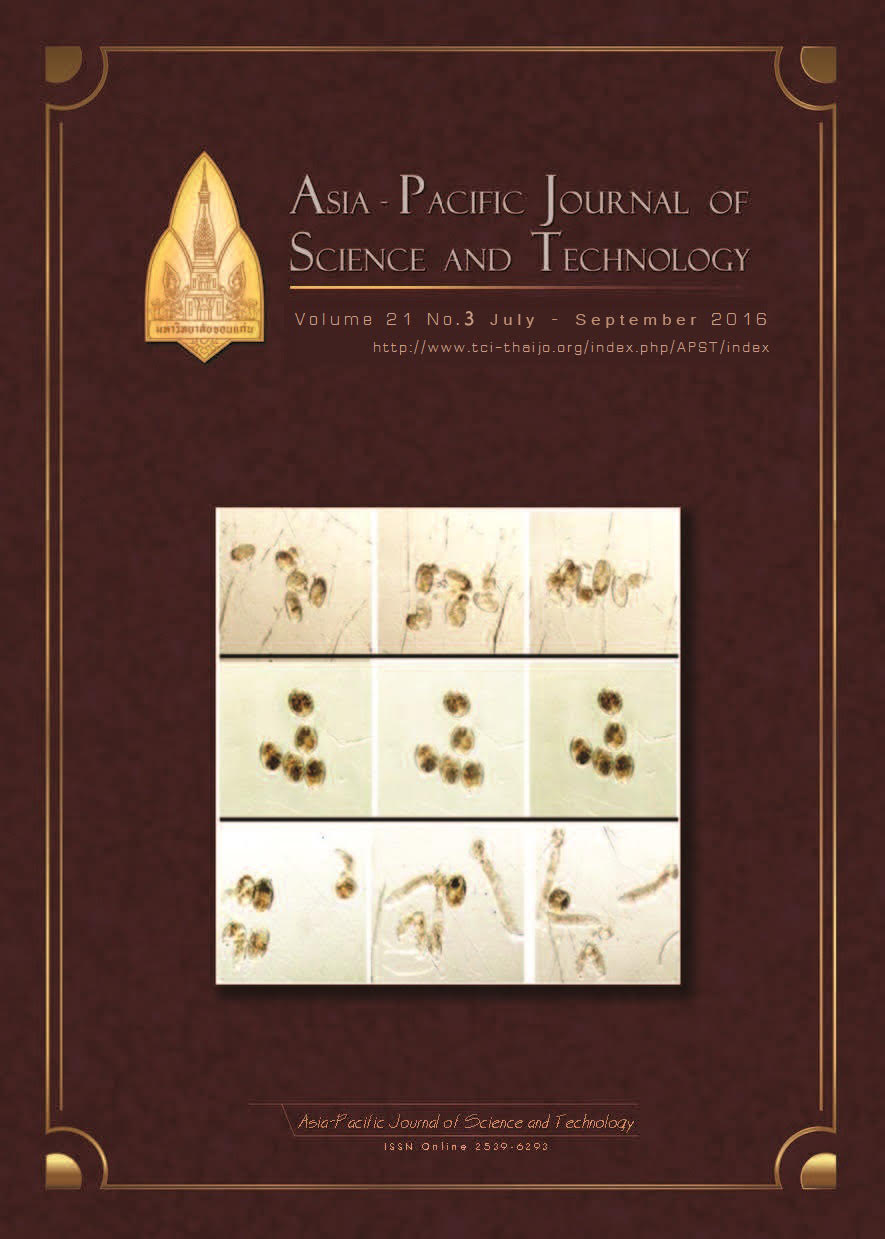Effects of storage duration at low temperature on hatchability and post-hatch performances of Japanese quails (Coturnix japonica)
Main Article Content
Abstract
This study aimed to determine the effect of duration storage of Japanese quail eggs at low temperature on hatchability and post-hatch performance. A total of 800 eggs was subjected to four storage periods, (0, 3, 5 and 7 d) at 4ºC and 60 to 70% relative humidity. Hatchability, survival rate, birth weight, post-hatch average daily gain, feed intake and feed conversion ratio were investigated in this study. The results showed that storage duration significantly affected hatchabilities and survival rates (P<0.05). Egg hatchability decreased when they were stored for a long time (84.5, 79.5, 74.0, and 69.0% for 0, 3, 5 and 7 d of storage duration, respectively). Survival rates of eggs stored for 3 d was not significantly different from the control group. Survival rates of 5- and 7-d storage were lower than 0- and 3-d groups (P<0.05). Storage egg at 4ºC did not affect birth weight, post-hatch average daily gain, feed intake and feed conversion ratio of the Japanese quails. The results of this study suggested that keeping egg of Japanese quails for 0 d before incubation was the best for hatchability. For incubation, Japanese quail eggs should not be stored at 4ºC longer than 3 d.
Article Details
References
Suppadit T, Jaturasitha S, Sunthorn N, Poungsuk P. Dietary Wolffia arrhiza meal as a substitute for soybean meal: its effects on the productive performance and egg quality of laying Japanese quails. Trop Anim Health Prod. 2012;44(7): 1479-86.
Narinc D, Karaman E, Aksoy T, Firat MZ. Genetic parameter estimates of growth curve and reproduction traits in Japanese quail. Poult Sci. 2014;93(1): 24-30.
Narinc D, Aygun A, Karaman E, Aksoy T. Egg shell quality in Japanese quail: characteristics, heritabilities and genetic and phenotypic relationships. Animal 2015;9(7): 1091-6.
Aydin R, Cook ME. The effect of dietary conjugated linoleic acid on egg yolk fatty acids and hatchability in Japanese quail. Poult Sci. 2004;83(12): 2016-22.
Kulenkamp AW, Kulenkamp CM, Coleman TH. The effects of intensive inbreeding (brother x sister) on various traits in Japanese quail. Poult Sci. 1973;52: 1240-6.
Chahil PS, Johnson WA, Schilling PE. Combining ability in a diallel cross of three lines of Coturnix coturnix japonica. Poult Sci. 1975;54(6): 1844-9.
Dymond J, Vinyard B, Nicholson AD, French NA, Bakst MR. Short periods of incubation during egg storage increase hatchability and chick quality in long-stored broiler eggs. Poult Sci. 2013;92(11): 2977-87.
Lapao C, Gama LT, Soares MC. Effects of broiler breeder age and length of egg storage on albumen characteristics and hatchability. Poult Sci. 1999;78(5): 640-5.
Alsobayel AA, Albadry MA. Effect of storage period and strain of layer on internal and external quality characteristics of eggs marketed in Riyadh area. J Saudi Soc Agric Sci. 2011;10(1): 41-5.
King'ori AM. Review of the factors that influence egg fertility and hatchabilty in poultry. Int J Poult Sci. 2011;10(6): 483-92.
Ali K. Effects of different storage durations of Japanese quails (Coturnix coturnix japonica) eggs on their hatching chick rates and live weight gains. J Anim Vet Adv. 2010;9(9): 1358-61.
Narahari D, Abdul Mujeer K, Thangavel A, Ramamurthy N, Viswanathan S, Mohan B, Muruganandan B, Sundararasu V. Traits influencing the hatching performance of Japanese quail eggs. Brit Poultry Sci. 1988;29(1): 101-12.
Imai C, Mowlah A, Saito J. Storage stability of Japanese quail (Coturnix coturnix japonica) eggs at room temperature. Poult Sci. 1984;65: 474-80.
Aygun A, Sert D. Effects of prestorage application of propolis and storage time on eggshell microbial activity, hatchability, and chick performance in Japanese quail (Coturnix coturnix japonica) eggs. Poult Sci. 2013;92(12): 3330-7.
Hassan SM, Siam AA, Mady ME, Cartwright AL. Egg storage period and weight effects on hatchability of ostrich (Struthio camelus) eggs. Poult Sci. 2005;84(12): 1908-12.
Daikwo SI, Dim NI, Momoh MO. Hatching characteristics of Japanese quail eggs in a tropical environment. Int J Poult Sci. 2011;10(11): 876-8.
Khurshid A, Farooq M, Durrani FR, Sarbiland K, Manzoor A. Hatching performance of Japanese quails. Livest Res Rural Dev. 2004;16: 1-5.
Wentworth B, Cigan J, Schaaf T. Tolerance of Japanese quail embryos and young chicks to hypothermia. Poult Sci. 2009;88(5): 1040-3.
Hyankova L, Novotna B. Divergent selection for shape of growth curve in Japanese quail. 7. Effect of egg storage at high temperature on embryo development and hatchability. Brit Poultry Sci. 2014;54(6): 695-703.
Fasenko GM. Egg storage and the embryo. Poult Sci. 2007;86(5): 1020-4.
Farooq M, Aneela K, Durrani FR, Muqarrab AK, Chand C, Khurshid A. Egg and shell weight, hatching and reproductive performance of Japanese broiler quails. Sarhad J Agric. 2011;17: 289-93.
Narahari D, Abdul Mujeer K, Thangavel A, Ramamurthy N, Viswanathan S, Mohan B, Muruganandan B, Sundararasu V. Traits influencing the hatching performance of Japanese quail eggs. Brit Poultry Sci. 2007;29(1): 101-12.
Erener G, Ozer A, Ocak N. Growth and laying performance of Japanese quail fed graded levels of hazelnut kernel oil meal incorporated into diets. Asian-Aust J Anim Sci 2003;16(12): 1789-94.


